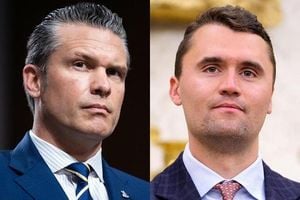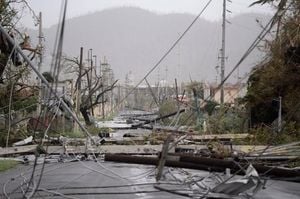Kilmar Abrego Garcia’s story, already complicated by years of legal limbo and a mistaken deportation, has become a lightning rod in the debate over the Trump administration’s controversial third-country deportation policies. On Monday, August 25, 2025, the Salvadoran national and longtime Maryland resident was detained by U.S. Immigration and Customs Enforcement (ICE) in Baltimore. Now, he faces the prospect of being sent to Uganda—a country to which he has no ties—under a policy that has drawn fierce criticism from human rights groups and ignited legal battles across the United States.
Abrego Garcia, 30, has lived in Maryland for years with his American wife and children. Since 2019, he has been under protected legal status after a federal judge ruled that he should not be deported to El Salvador, his home country, due to credible fears for his safety. According to The Associated Press, his case took a dramatic turn in March 2025, when he was mistakenly deported to El Salvador in violation of a 2019 court order. There, he was reportedly subjected to severe physical and psychological abuse in the notorious CECOT mega-prison, an experience his lawyers described as “torturous” in civil court filings.
After months in El Salvador, the Trump administration was compelled by court order to return Abrego Garcia to the U.S. in June. But his ordeal was far from over. Upon his return, he was charged in Tennessee with human smuggling—allegations he denies—and held in federal custody. Released from jail on Friday, August 22, 2025, Abrego Garcia was reunited with his family in Maryland, only to be detained again by ICE when he reported for a routine check-in the following Monday.
His new detention triggered an immediate legal response. As reported by DC News Now, Abrego Garcia’s legal team filed suit in federal court in Maryland, invoking a blanket court order that automatically pauses any deportation of immigrants challenging their detention until 4:00 p.m. on the second business day after filing a habeas corpus petition. This order, which applies to all immigrants seeking review of their detention in Maryland, was itself the subject of a separate lawsuit by the Trump administration in June, which sued all 15 of Maryland’s federal judges in an attempt to overturn the policy.
In a dramatic hearing on Monday, U.S. District Judge Paula Xinis issued a clear directive: “Your clients are absolutely forbidden at this juncture to remove Mr. Abrego Garcia from the continental United States.” Justice Department lawyer Drew Ensign replied, “We certainly understand that.” Judge Xinis further ordered that Abrego Garcia not be moved from the Virginia detention facility where he is currently housed, to ensure he has access to legal counsel as the case proceeds. Both sides were directed to submit a schedule for evidentiary hearings by Tuesday morning.
The government’s latest effort to deport Abrego Garcia to Uganda came after he refused a plea deal that would have seen him serve jail time and then be deported to Costa Rica—a country that, according to court records, offered assurances he could move freely. In contrast, Abrego Garcia and his lawyers argue that he faces a credible risk of persecution in Uganda, and fear that the African nation could in turn send him back to El Salvador. Sealed court filings cited by The Hill show that Abrego Garcia signed a statement expressing his fear of being sent to Uganda and his preference for Costa Rica as his country of removal.
Uganda only recently agreed to accept certain U.S. deportees, as part of a broader expansion of the Trump administration’s third-country deportation agreements. According to The Associated Press, the deal with Uganda—finalized in the week before August 26, 2025—stipulates that the country will take deportees who do not have criminal records and are not unaccompanied minors. This agreement is just one in a series the U.S. has struck with nations across Latin America and Africa, including Costa Rica, Panama, South Sudan, and Eswatini. The administration has argued that these measures are necessary to address what it calls “national security threats” posed by immigrants who cannot be returned to their home countries, often because those countries refuse to accept them.
Department of Homeland Security Secretary Kristi Noem confirmed on X that Abrego Garcia was being processed for deportation to Uganda. The Department of Justice, meanwhile, has maintained that Abrego Garcia is a “clear danger” to the community and accused him of being an MS-13 gang member—allegations he vehemently denies. His trial on human smuggling charges is scheduled for January 2027 in Tennessee. Abrego Garcia’s legal team has accused the government of vindictive prosecution, arguing that the push to deport him to Uganda only began after he refused the plea deal and that such actions violate his constitutional rights.
Human rights advocates have condemned the third-country agreements as dangerous and potentially unlawful. United Nations experts warned in July that such deals “have left people stranded in faraway places, arbitrarily detained for years on end, and at risk of torture and other inhuman treatment.” They urged the U.S. government to “refrain from any further removals to third countries, to ensure effective access to legal assistance for those facing deportation, and all such procedures to be subject to independent judicial oversight.”
The Trump administration’s approach has not been without precedent elsewhere. The European Union has explored similar “return hubs” in third countries, and Italy has sent rejected asylum seekers to detention centers in Albania. The United Kingdom’s attempt to send asylum seekers to Rwanda was ultimately blocked by the courts. Yet, critics argue that the U.S. program is especially opaque and rushed, with deportations sometimes occurring with as little as six hours’ notice, as permitted by a Supreme Court decision in June 2025.
Abrego Garcia’s case has become emblematic of the perils and complexities of these policies. At a rally before his most recent detention, he addressed supporters through a translator: “This administration has hit us hard, but I want to tell you guys something: God is with us, and God will never leave us. God will bring justice to all the injustice we are suffering.”
As the legal battle continues, Abrego Garcia remains in detention, his fate uncertain. His case has drawn national attention not only for its high stakes but also for the broader questions it raises about due process, human rights, and the reach of executive power in immigration enforcement. With evidentiary hearings on the horizon and the eyes of both advocates and critics fixed on his case, the outcome may set a precedent for hundreds, if not thousands, of others caught in the crosshairs of America’s evolving deportation policies.
For now, one thing is certain: the struggle over where—and whether—Kilmar Abrego Garcia will be sent next is far from over.





